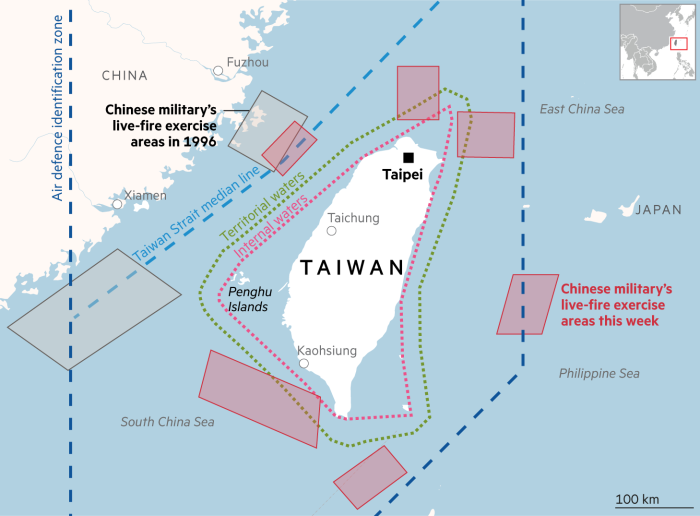China suspends links with US military and climate talks over Taiwan
China has suspended regular communication channels with the US military, as well as climate talks between the world’s two largest economies, in retaliation for US House Speaker Nancy Pelosi’s visit to Taiwan this week.
The Chinese foreign ministry declaration came after the country’s military sent planes and warships to probe Taiwan’s defences for a second day.
Taiwan’s defence ministry said 68 Chinese military aircraft and 13 warships operated in the Taiwan Strait on Friday. Forty-nine of the aircraft entered Taiwan’s air defence identification zone and 30 of those crossed the median line, an unofficial division of the strait drawn by the US decades ago to lower the risk of conflict.
In addition to suspending communication channels with the US military and bilateral climate change talks. US special climate envoy John Kerry, who was due to meet with his Chinese counterpart again next month, said the decision “punishes the world”.
It was “disappointing and misguided”, and risked harming the developing world more than the US, he said in a statement. “The climate crisis is not a bilateral issue, it’s universal,” said Kerry, describing the consequences of the climate threat as “catastrophic” and beyond geopolitics and ideology.
Beijing said it would also no longer co-operate with Washington on a range of legal issues, including repatriation of illegal immigrants, drug trafficking and other crimes. It added that it was doing so because Pelosi’s visit had proceeded “in disregard of China’s strong opposition and serious representations”.
China’s foreign ministry had said earlier on Friday afternoon that it would impose unspecified sanctions against Pelosi and members of her immediate family.
Todd Breasseale, Pentagon press secretary, said China had overreacted to Pelosi’s visit and used it as a “pretext” for “provocative military activity”.
“Part of this overreaction has been strictly limiting its defence engagements when any responsible state would recognise that we need them now the most,” Breasseale said. “Although the PRC has unilaterally turned off a number of defence engagements, we remain open to communication and committed to building crisis communications and risk-reduction mechanisms.”

Jing Quan, a senior official at the Chinese embassy in Washington, said the US was shifting the blame by accusing China of overreacting to the visit.
“You cannot be provocative and not allow others to defend themselves,” said Jing. “Taiwan is one of the very few issues that might take China and the United States to conflict or even war.”
President Xi Jinping’s administration had initially directed its ire squarely at Taiwan, starting an unprecedented series of military exercises in six zones ringing the island and suspending trade in a range of goods. The exercises commenced a day after Pelosi left Taiwan for South Korea and Japan.
The most serious cross-Strait crisis in almost 60 years has prompted one of Taiwan’s richest men to donate millions of dollars to its security.
Robert Tsao, founder of contract chipmaker United Microelectronics Corp, announced that he would contribute NT$3bn ($100mn) towards Taiwan’s defence.
“With the Chinese Communist party acting so despotically towards Taiwan, perhaps they think Taiwanese people all fear death and covet money?” he said at a fiery press conference. “But I hope . . . we stand up and fight to defend freedom, democracy and human rights.”
Tsao previously told Taiwanese media that his two sons would return to the country if China invaded. His latest comments were the strongest from the high-profile businessman in Taiwan’s technology hardware sector since the start of the military drills this week.
On the last stop of her five-nation tour, Pelosi met Japanese prime minister Fumio Kishida, who condemned China’s missile launches and called for an immediate end to military drills.
Pelosi said at a press conference that while the Taiwan visit was not intended to change the status quo, it took place against a backdrop of repeated attempts by China to isolate Taiwan from the rest of the world.
Some of the missiles launched by China landed in Japan’s exclusive economic zone.
Chinese official media, meanwhile, sought to drum up support for the exercises following an international backlash. An op-ed in the military mouthpiece PLA Daily said the drills were aimed at “deterrence” after Taiwan and the US colluded to change the status quo across the Taiwan Strait, an echo of Beijing’s insistence that Washington was ultimately responsible for provoking Russia’s invasion of Ukraine in February.
Meng Xiangqing, a professor at the National Defence University in Beijing, claimed that a US aircraft carrier, the USS Ronald Reagan, had been forced to retreat several hundred kilometres after the People’s Liberation Army set up a firing range to the east of Taiwan.
Pelosi’s trip across Asia has also underscored the diplomatic quandary for regional leaders caught in the tensions between the world’s two biggest economies. On Thursday, South Korean president Yoon Suk-yeol declined to meet Pelosi during her visit to Seoul, as his administration comes under increasing Chinese pressure over its commercial and defence ties with the US.
The apparent snub was cheered by Chinese media and netizens. “Pelosi doesn’t appear to be popular in Seoul,” wrote the Chinese state-owned nationalist tabloid Global Times.
Additional reporting by William Langley in Hong Kong, Leo Lewis in Tokyo and Maiqi Ding in Beijing